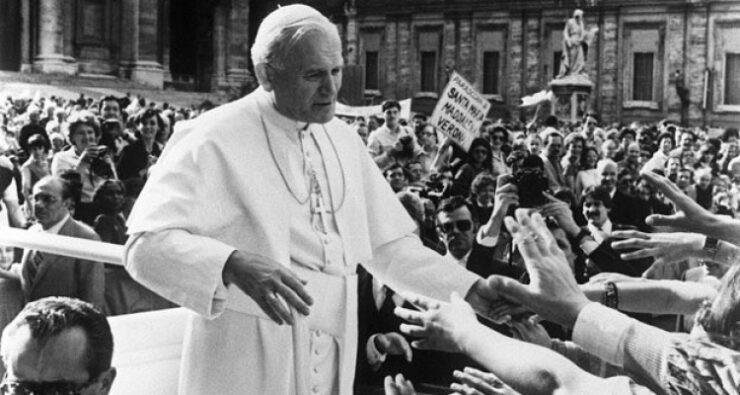“Whoever questions the holiness of Karol Wojtyła, and there are also a handful of Catholics among them, does not know what he/she is saying.” Cardinal Ruini has no doubt that questioning the sanctity of the Pope has no justification, and he was one of John Paul II’s closest associates.
From 1991 to 2008 he was the Papal vicar for the Diocese of Rome, for many years he presided over the Italian Episcopate and for almost 30 years he was considered one of the most influential figures of the Church in Italy. Although he turned 89, he remained an extremely penetrating observer of ecclesiastical and political life in Italy and around the world. In the latest issue of Il Foglio, an opinion-forming Italian newspaper, an interview with the purple appeared which is supposed to be Cardinal Ruini’s answer for attacks against John Paul II.
At the beginning of the interview Matteo Matzuzzi, the journalist “Il Foglio”, asked the Cardinal to comment on an article in the New York Times in which the opinion that John Paul II had become a saint too hastily was stated. In response, Cardinal Ruini recalled the moment of the Pope’s death and his funeral, which he said was “the apogee of the Catholic Church, where it is difficult not to see the hand of God”, and the cries of the people of “Santo Subito” (Holy immediately).
He also revealed that after the funeral Cardinal Tomko took the initiative to collect the signatures of Cardinals who intended to ask the future pope for release from the five-year waiting period before the start of the beatification process. “More than eighty cardinals signed, and Tomko presented me with a petition as a Cardinal Vicar (beatification and canonization processes of Popes take place in the Diocese of Rome, of which Popes are bishops. – explains W.R.) – recalls Cardinal Ruini. He added: “At the first audience given to me by Benedict XVI, I introduced it to him and the new Pope immediately agreed. As for the rest, the beatification process, and subsequent canonization, proceeded with absolute regularity, with all standards.”
The Cardinal explained that the speed of beatification and canonization processes depends to a large extent on the recognition of the miracles required by law, and in the case of John Paul II miracles happened: “And, such miracles!” In addition, Cardinal Ruini emphasized the fact of the widespread worldwide worship of St. John Paul II, also at his tomb in the Basilica of St. Peter.
The journalist asked the Cardinal to provide a response to all those who question the “holiness” of John Paul II. “Having been in close contact with John Paul II for almost twenty years, I gradually became convinced that I was dealing with a great saint, but also with a great man. The intensity of his prayer struck me from the very beginning – immediately and completely plunged into prayer as soon as circumstances allowed him, and nothing that was happening around him distracted him.”
The second “element” of the Pope’s holiness was the extraordinary ability to forgive. “I often had to signal to him criticism, even very forcibly, of the lines of his pontificate and himself. The Pope responded by trying first of all to understand them and to some extent to justify these objections. He never considered the hypothesis of retaliation.” The Italian purple then mentioned the Pope’s personality trait, which is rarely said: “John Paul II was completely detached from the earthly goods, and his personal belongings were cared for by others out of love for him. On the other hand, he himself was very happy to help the poor, starting with ‘hungry peoples’, for example the people of the Sahel” (John Paul II created the Sahel Foundation on February 22, 1984 to help the people of this part of Africa, particularly those at risk of drought -p. W.R.).
In the summary of the statement on the holiness of John Paul II cardinal Ruini said forcibly: “Whoever questions his holiness is blinded by prejudice and does not know what he/she is saying. I am particularly touched when Catholics take this position.”
The second part of the interview is devoted to speculation around the recently published McCarrick Report. The journalist asked the Cardinal whether it was right to say that the Pope had treated the leadership of the Roman Curia and the appointments of the Bishop too superficially. In response, Ruini explained that “John Paul II carefully selected his closest associates and trusted them, he was not someone who wanted to bring power into his hands. (…) At the same time, he had a great sense of self-responsibility and mission, which also included the dimension of government.
When he had to make important decisions, which are certainly the appointments of bishops, especially important dioceses, he devoted more time to it and devoted this time to prayer and reflection. I will not discuss the nomination of McCarrick because I do not know it and have not participated in it, as this went beyond my duties with regard to the Diocese of Rome and the Italian Church.
However, I can say that it is false and deeply unfair to accus John Paul II of superficiality – nothing in his way of being and acting was superficial.”
The interview also touched on the role of Cardinal Stanislaw Dziwisz, the personal secretary of John Paul II, whom many accuse of influencing the Pope’s decisions too much, starting with the decision to appoint McCarrick as the Archbishop of Washington. The Cardinal emphasized that “don Stanislao”, because that is what everyone called him in the Vatican, who “is a true priest, completely devoted to his ministry”, “was completely faithful to John Paul II”, so “the Pope trusted him very much, considering him for good reason to be a valuable and always loyal help”.
Cardinal Ruini cited an episode that took place in January 2005 in which the Pope strongly opposed “don Stanislao”. “The influence of Fr. Stanislaus, even in the last pontificate of John Paul II, was not able to reverse the roles – the one who decided was the Pope, and also the “don Stanislao” himself never wanted it to be different.”
Cardinal Ruini also rejects the idea that John Paul II was “intimidated” by McCarrick’s expansiveness and strong position. “To think that McCarrick, and even people much more important than him, could intimidate John Paul II is just ridiculous. His sentence at the beginning of the pontificate ‘Do not be afraid’ remained famous, and John Paul II was personally not afraid of anyone in the world. In many circumstances, I could see that courage, both physical and moral, was natural in it.
The lack of fear and intimidation went hand in hand with great attention and respect for everyone, including the most humble, and even more so for bishops, which is why John Paul II took great care to make accusations against people.”
In the current discussions about John Paul II’s mission and holiness, in which people who did not know and had nothing to do with the Pope speak, it is worth listening to the voice of true witnesses of his work and life, and this is undoubtedly Cardinal Camillo Ruini.
Włodzimierz Rędzioch





